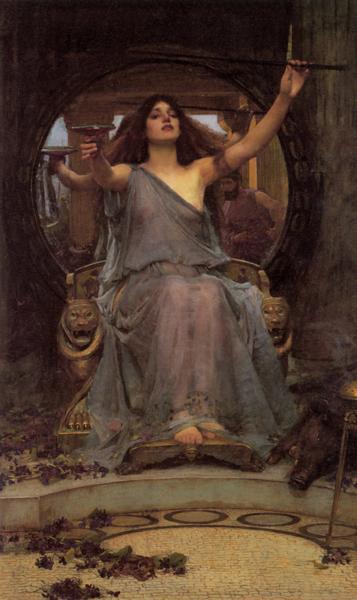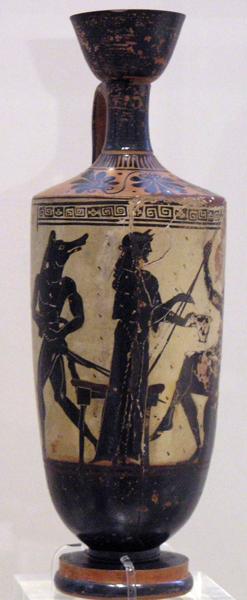In the epic tale of The Odyssey by Homer, there are many legendary characters who captivate readers with their unique and mysterious qualities. One such character is Circe, the bewitching witch who plays a significant role in shaping Odysseus’ journey. Circe’s enigmatic nature and extraordinary powers have intrigued scholars and readers for centuries, making her one of the most compelling figures in ancient Greek mythology.
This article aims to unravel the enigma of Circe by delving into her mesmerizing beauty, immense powers, and complex relationship with Odysseus. It will explore her role as a mentor to the hero and analyze the consequences of her enchantments on both him and his companions.
Furthermore, it will reflect on Circe’s transformation from a vengeful witch to a helping hand for Odysseus and how she has left an enduring impact on both ancient Greek mythology and modern pop culture.
Before diving into the depths of Circe’s character, it is essential to understand her overall role in The Odyssey. In summary, Circe serves as a pivotal character who tests Odysseus’ courage and wit while also providing him with crucial guidance. Her encounters with Odysseus and his crew result in transformative experiences that shape their journey home from Troy.
Circe possesses an alluring aura that mesmerizes all those who cross her path. Not only is she known for her captivating physical beauty but also for her tempting presence that lures men into her grasp. Her enchanting persona has been immortalized through various artistic interpretations throughout history.
Beyond her captivating allure, Circe possesses immense powers rooted in divine witchcraft. She is renowned for her ability to transform men into animals through sorcery – an ability that adds complexity to Odysseus’ encounter with her. As we examine this power further, we will uncover the perils of these transformations and their lasting effects on those affected.
The encounter between Odysseus and Circe marks a turning point in the story, as it challenges the crew’s sense of agency and free will. It raises questions about the fragility of human nature and the extent to which individuals can resist temptation when faced with powerful spells and enchantments. The consequences of Circe’s magic serve as a cautionary tale, reminding us of the dangers of succumbing to one’s desires without considering the long-term repercussions.
One cannot discuss Circe without delving into her tumultuous relationship with Odysseus. Their complicated bond is shaped by love, desire, and an unyielding quest for freedom. Through exploring their interactions and examining their impact on each other’s lives, we gain insight into the depths of their connection and its influence on their respective journeys.
Throughout Odysseus’ time on Aeaea, Circe also assumes the role of a mentor, offering guidance and wisdom. Her teachings aid our hero in his quest for self-discovery and personal growth. By analyzing this role more closely, we can uncover the depths of her influence on Odysseus’ character development.
The Tale Unfolded
In the epic poem The Odyssey by Homer, the character of Circe plays a significant role in Odysseus’ journey home to Ithaca. Circe is a bewitching witch with immense powers and sorcery, making her a formidable obstacle for Odysseus and his crew.
As the story progresses, Odysseus and his men find themselves on the island of Aeaea, where they encounter Circe. Captivated by her mesmerizing beauty and tempting presence, the crew is lured into her domain. Circe welcomes them into her palace but soon exposes their vulnerability by turning them into pigs through her potent transmogrifications. This twist of fate leads to a series of perils and challenges for Odysseus.
One of the remarkable aspects of Circe’s character is her divine witchcraft. She possesses immense powers that allow her to manipulate mortals and influence their actions. Through her enchantments, she robs Odysseus’ crew members of their free will, highlighting the fragility thereof.
Despite being portrayed as a malicious witch at first, Circe also exhibits wisdom and acts as a mentor figure for Odysseus. Recognizing his potential and courage, she guides him on how to navigate various trials he must face in order to continue his journey back home.
However, there is another layer to the relationship between Odysseus and Circe. While under her spells, Odysseus becomes infatuated with Circe and succumbs to love-stricken emotions for her. This tumultuous relationship adds complexity to their interactions and further explores themes surrounding desire, temptation, and loyalty.
Throughout ancient Greek mythology, many characters undergo transformations that lead to redemption or personal growth – Circe is no exception. Initially depicted as a vengeful witch who turns men into swine, she eventually becomes a helping hand for Odysseus, assisting him on his quest to return home. This transformation showcases her capacity for change and evolution.
Circe’s character has had a lasting impact on both ancient Greek mythology and modern pop culture. In ancient times, her story served as a cautionary tale about the perils of desire and the consequences of crossing powerful beings. In modern times, her character has been reinterpreted and retold in various forms of literature, art, and entertainment.
Overall, Circe’s tale in The Odyssey is a captivating one that delves into themes of power, desire, transformation, and redemption. Through her complex relationship with Odysseus and her role as a mentor figure, Circe leaves a lasting impression on readers and reminds them of the importance of resilience and self-discovery in the face of adversity.

Exploring Circe’s Mesmerising Beauty and Tempting Presence
Circe, the bewitching witch in the Odyssey by Homer, is not only known for her immense powers and sorcery but also for her mesmerizing beauty and tempting presence. Her alluring aura has captivated readers for centuries, adding a layer of mystique to her character. In this section, we will delve into the enchanting qualities that make Circe a compelling figure in Greek mythology.
One of the defining characteristics of Circe is her physical beauty. Described as having golden hair and radiant eyes, she possesses an otherworldly attractiveness that draws people towards her. Her enchanting appearance serves as a powerful tool to entice and manipulate those who encounter her. Whether it be Odysseus or his crew, they cannot resist the allure of Circe’s beauty.
However, it is not just Circe’s physical appearance that captivates those around her. She also possesses a magnetic personality and an air of confidence that adds to her allure. The way she carries herself and speaks with authority mesmerizes those who cross her path. Combined with her beauty, this creates an irresistible combination that makes it difficult for anyone to escape her influence.
In addition to her captivating presence, Circe’s ability to seduce with words further enhances her allure. She possesses great eloquence and persuasive skills, which she employs to manipulate others for personal gain. Her words are laced with charm and charisma, making it nearly impossible for anyone to resist succumbing to her desires.
Circe‘s mesmerizing beauty and tempting presence play crucial roles in the narrative of The Odyssey. They are integral to both the plotline and character development of various individuals in the epic poem. It is through these qualities that Circe establishes dominance over Odysseus and his companions when they encounter her on their journey home.
| Alluring Aura Qualities |
|---|
| Physical Beauty |
| Magnetic Personality and Confidence |
| Persuasive and Eloquent |
| Plot and Character Development |
Circe’s alluring aura is a central element in her role as a temptress and sorceress. It showcases the complexity of her character, blurring the lines between good and evil. Her irresistible charm serves as a cautionary reminder of the dangers of falling prey to one’s desires. Circe teaches us that beauty can be deceiving and that succumbing to temptation may have dire consequences.
Divine Witchcraft
The Origins of Circe’s Powers
Circe, the bewitching witch in the Odyssey, is known for her immense powers and sorcery. Her abilities are not merely human but transcend into the realm of the divine. According to Greek mythology, Circe is the daughter of Helios, the sun god, and Perse, an Oceanid nymph. This divine lineage bestowed upon her extraordinary powers that set her apart from mortals.
Circe’s ability to transform others into animals or alter their forms is one of her most well-known powers. This power stems from the extensive knowledge she possesses of various herbs and potions. With her potions, she can concoct spells that manipulate reality itself. This aspect of Circe’s character highlights her deep connection with nature and illustrates how her magic relies on harnessing natural elements.
The Manipulative Artistry of Circe
Circe is also skilled in the art of enchantment and manipulation. Her captivating aura and tempting presence make it easy for her to lure unsuspecting travellers to her island. Once there, she uses her irresistible charm and manipulative tactics to change them according to her whims. These transformations are not purely physical; they also have a profound impact on their psyche.
Moreover, Circe possesses the ability to control others’ minds through her powerful incantations. With a mere utterance of a spell or a wave of her wand, she can compel individuals to do as she wishes. This manipulation extends beyond simply transforming humans into animals; it delves into the intricate depths of psychological warfare.
The Limits and Vulnerabilities
Despite possessing immense powers, it is crucial to note that even Circe has limitations and vulnerabilities. One such vulnerability lies in a special herb called moly that gives individuals protection against her magic. Odysseus was given this herb by Hermes before confronting Circe, which allowed him to resist her enchantments.
Additionally, Circe’s powers are not absolute and immutable. She is still bound by the constraints of fate and the gods’ will. Her ability to transform others can be thwarted or counteracted by more powerful divine entities if they so choose. This aspect showcases that even beings with extraordinary abilities are not exempt from higher authorities.
The Moral Implications
Circe’s immense powers raise intriguing moral questions and dilemmas. Her actions often blur the line between right and wrong, stretching the ethical boundaries of her sorcery. While some may argue that Circe’s transformations and mind control are cruel and malicious, it is essential to recognize that she wields her power for a purpose.
Her encounters with Odysseus and his crew exemplify this complexity. Circe sees herself as a protector of her homeland against potential threats, and she uses her magic to safeguard herself from harm. However, it is crucial to question whether this justifies the manipulation she inflicts on others. The moral implications surrounding Circe’s powers add depth to her character and invite readers to consider their own perspectives on the concept of power in relation to morality.
As the journey of Odysseus and his crew unfolds in the epic poem, The Odyssey, they encounter countless challenges and adversaries. However, none are as significant or captivating as their encounter with Circe, the bewitching witch. This section will explore the pivotal moment when Odysseus and his crew stumble upon Circe’s enchantments and delve into the consequences that follow.
When Odysseus and his men arrive on the island of Aeaea, they are greeted by a mysterious woman. Unbeknownst to them, this woman is none other than Circe herself. With her enticing beauty and irresistible aura, she lures the men into her abode. Little do they know that this seemingly innocent encounter will forever change their lives.
Circe’s immense powers in sorcery become immediately evident when she offers a sumptuous feast to Odysseus and his crew. Unbeknownst to them; however, Circe has added a potent potion to their wine, which transforms them into swine. Suddenly trapped in the bodies of animals, Odysseus’ men fall victim to Circe’s spell.
This turning point in the story marks a significant shift in both plot and character development. The transformation of Odysseus’ companions symbolizes their loss of agency and free will under Circe’s enchantments. It emphasizes the vulnerability of mortals in the presence of immortals with divine powers, such as Circe.
The consequences of Circe’s transmogrifications extend beyond mere physical transformations; they also evoke deep psychological turmoil within Odysseus himself. As he witnesses his loyal companions morph into pigs before his eyes, he becomes acutely aware of his powerlessness against this mysterious enchantress. This realization fuels him with a newfound determination to outwit Circe and save his comrades from what seems like an eternal curse.
However, it is not only through adversity that Odysseus grows as a character. His tumultuous relationship with Circe adds a layer of complexity to his journey and showcases the power of love and desire. Despite her bewitching powers, Circe becomes infatuated with Odysseus and falls in love with him. This unexpected turn of events reveals Circe’s vulnerability and multifaceted nature, transforming her from a mere villain to a complex character worth exploring.
In this section, we have delved into the pivotal moment when Odysseus and his crew encounter Circe’s enchantments on the island of Aeaea. We have witnessed the transformative power of her sorcery, both physically and psychologically, on Odysseus and his companions. As they navigate this treacherous encounter, we begin to see the intricate dynamics of relationships unfold between them, shedding light on their vulnerabilities and desires.
The Perils of Transformation
Circe, the enchanting witch in Homer’s Odyssey, possesses immense powers that allow her to practice transmogrifications – the ability to transform humans into animals. This section delves into the perils surrounding Circe’s transmogrifications and analyzes the far-reaching consequences of her actions.
One of the significant perils associated with Circe’s transmogrifications is the loss of identity. When Odysseus and his crew stumble upon Circe’s island, they are trapped in her spells and undergo a frightful transformation. Their bodies are changed into animals, turning them into powerless creatures stripped of their humanity. The crew members, now transformed into swine, have lost not only their physical appearance but also their sense of self.
Additionally, these transmogrifications emphasize the vulnerability of Odysseus and his companions. Transformed into helpless creatures under Circe’s spells, they are subject to her control and manipulation. Through this perilous situation, Homer explores the limits of mortal power and showcases the dominance and authority that a powerful sorceress like Circe possesses.
Furthermore, the consequences stretch beyond mere physical transformations. The emotional impact on those transformed is profound. The psychological distress experienced by Odysseus as he witnesses his loyal crewmates turned into swine intensifies his feelings of isolation and despair. The terror they experience forces them to confront their own mortality as well as question their place in the world.
Moreover, these transformations shed light on themes concerning morality and free will. Having been transformed against their will, Odysseus and his companions become slaves to Circe’s commands. Their ability to exercise free will is compromised as they must comply with her wishes or risk further punishment. This highlights the fragility of human agency under supernatural forces.
Another peril associated with Circe’s transmogrifications lies in potential permanent damage to relationships among characters in the story. As Odysseus interacts with his metamorphosed crew members, it becomes evident that the transformation has not only altered their physical form but also compromised their bonds of camaraderie. The loss of human connection and emotional attachment brings forth a sense of alienation and divides the once closely-knit crew.
The Fragility of Free Will
Circe, the bewitching witch in the Odyssey, is known for her ability to manipulate others using her powerful spells. One of the most fascinating aspects of Circe’s character is the way in which she affects the free will of those who encounter her. In this section, we will delve into the effect that Circe’s spells have on Odysseus and his companions, highlighting the fragility of free will in their interactions with her.
When Odysseus and his crew first encounter Circe, they are lured by her enchanting beauty and tempting presence. By utilizing her supernatural powers and sorcery, Circe is able to captivate their attention and draw them closer to her realm. This alluring aura plays a significant role in diminishing their free will as they become mesmerized by her charm.
Once under the spell of Circe, Odysseus and his companions find themselves transformed into animals. Circe’s ability to transmogrify them reflects not only her immense powers but also the control she has over their fate. This twist of fate showcases just how fragile human free will can be when faced with an overpowering force such as Circe.
The consequences of these transfigurations are dire for Odysseus and his men. As animals, they are stripped of their ability to reason and communicate like humans. They become vulnerable and helpless creatures at the mercy of Circe’s whims. This highlights not only the extent of Circe’s power but also the limitations of human agency when confronted with supernatural forces.
It is through these experiences that Odysseus comes to understand the fragility of free will in interactions with beings like Circe. Initially driven by his desire for personal glory, he learns that there are external factors beyond his control that can manipulate and shape his decisions. It is only through the guidance and wisdom of Circe, as a mentor figure, that Odysseus is able to navigate this delicate balance between his own agency and the external forces influencing him.
Furthermore, Circe’s spells not only affect Odysseus but also his companions. Their transformation into animals amplifies the fragility of their individual wills as they are completely subjected to Circe’s power. This illustrates the inherent vulnerability of humans when confronted with supernatural beings who possess the ability to manipulate their actions and desires.
A Love Stricken Sailor
Odysseus’ journey in the Odyssey is not only filled with perilous encounters and mythical creatures but also with complex relationships. One of the most intriguing relationships he develops throughout his adventures is with Circe, the bewitching witch. This section will delve into the tumultuous relationship between Odysseus and Circe, exploring their initial encounter, their emotional entanglements, and the impact it has on Odysseus’ quest to return home.
When Odysseus and his crew arrive on Aeaea, they stumble upon Circe’s enchanting abode. Drawn by her mesmerizing beauty and tempting presence, Odysseus finds himself captivated by Circe’s allure. It is said that her voice was as enchanting as her appearance, casting a spell over anyone who came across her path. This irresistible combination of charm and beauty makes it all too easy for Odysseus to succumb to Circe’s hold.
As an immortal witch with immense powers and sorcery at her disposal, Circe exerts control over both mortal men and gods alike. She demonstrates her divine witchcraft when she transforms a group of Odysseus’ crew into swine while under the effects of her potions. This twist of fate brings about a unique dynamic in Odysseus’ relationship with Circe – one filled with fear and vulnerability.
The consequences of Circe’s transmogrifications prove to be perilous for Odysseus and his crew. They are faced with the challenge of navigating through this unfamiliar realm where danger lurks at every turn. The trust between them is further tested when Circe offers assistance to Odysseus but warns him of the dangers he must face before continuing on his journey.
One cannot deny the fragility of free will when influenced by Circe’s spells. The enchantments placed upon Odysseus’ companions strip them of their humanity, highlighting the powerlessness of mortals in the face of divine forces. This raises questions about the extent to which individuals can resist their desires and maintain control in the presence of such overwhelming enchantments.
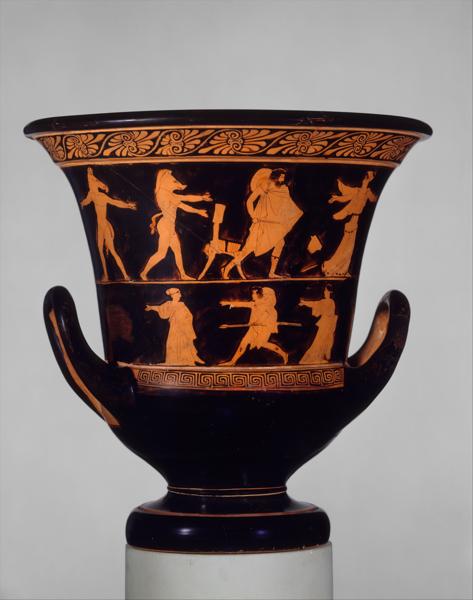
While Circe’s spells may have initially brought Odysseus and his crew under her control, it is Odysseus’ unique strength of character that sets him apart. Even when drawn to Circe and entangled in her web, he manages to assert his resilience and cunning. Odysseus’ ability to navigate the complexities of his relationship with Circe showcases his resourcefulness as a leader and ultimately contributes to his eventual redemption.
Despite the obstacles they face, a more intimate side of their relationship begins to emerge. Circe becomes a source of wisdom and guidance for Odysseus as she reveals important insights into his future, advising him on how to navigate various challenges he will encounter on his journey back home. Her role as a mentor highlights not only her immense knowledge but also her willingness to help Odysseus overcome adversity.
Circe’s Wisdom and Guidance
Though known primarily for her witchcraft and enchantments, Circe also plays the role of a mentor to Odysseus in The Odyssey. As he and his crew arrive at Aeaea, Circe provides them with valuable guidance and wisdom that aids them on their journey.
The Art of Transformation
One of the most significant ways in which Circe guides Odysseus is through her knowledge of transformation. She advises him on how to navigate the dangerous paths ahead by instructing him on the specific transformations that await him. She warns him about Scylla, the six-headed monster, and Charybdis, the whirlpool, giving him guidance on how to avoid these perils.
Furthermore, Circe helps Odysseus understand how he can overcome his own inner struggles. By admitting his weaknesses and embracing his humanity, she empowers him to face the challenges ahead with courage and resilience.
Unveiling Inner Strengths
Circe recognizes the hidden potential within Odysseus and encourages him to tap into his inner strengths. She reveals to him that becoming mortal again depends on facing obstacles with determination and self-belief. Through her guidance, he learns to trust in his abilities as a leader and warrior.
Circe’s mentorship also extends beyond Odysseus himself; she encourages his crew members to grow as individuals as well. She urges them to face their fears head-on and fosters a sense of camaraderie among them. In doing so, she moulds them into a stronger unit capable of overcoming any challenge that may come their way.
Teaching Patience and Self-Reflection
Another aspect of Circe’s role as a mentor is teaching patience and self-reflection. After transforming Odysseus’s crew into swine, she offers valuable insights into the importance of self-examination. She advises Odysseus to learn from his experiences and understand the consequences of his actions. This guidance helps Odysseus develop a greater sense of self-awareness, allowing him to become a wiser leader in the process.
Through her lessons, Circe emphasizes that personal growth requires time and introspection. She encourages Odysseus to take pause and reflect on the decisions he has made, as well as the impact they have had on himself and those around him.
Aid in Reuniting
Circe not only imparts wisdom but also aids Odysseus in reuniting with his lost companions. By giving him instructions on how to safely travel to Hades, she facilitates their reunion with their fallen comrades. Through this act, Circe showcases her compassionate side and demonstrates her commitment to guiding Odysseus towards reclaiming all that he has lost.
By providing invaluable advice, teaching important life lessons, and guiding Odysseus on his journey towards reuniting with his homeland, Circe proves herself to be much more than a powerful sorceress. Her role as a mentor contributes significantly to Odysseus’ growth and eventual triumph over adversity.
As Odysseus continues on his arduous journey home, it is clear that Circe’s guidance has profoundly impacted him both as a leader and an individual. Her teachings serve as a reminder of the transformative power of wise counsel and underscore the enduring legacy of Circe as a beloved character in Greek mythology.
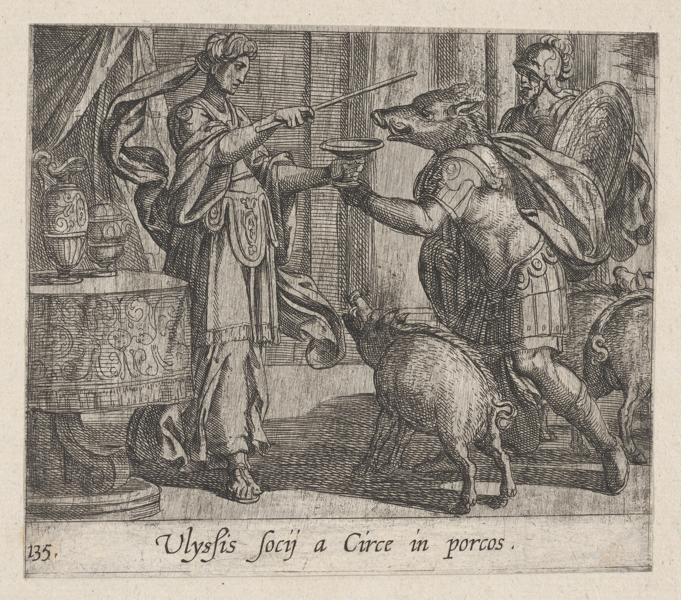
The Redemption of Circe
Throughout the epic poem, Circe undergoes a profound transformation, transitioning from a vengeful witch to a compassionate helper and mentor to Odysseus. Initially portrayed as a dangerous sorceress who turns men into animals, Circe eventually becomes crucial in assisting the hero on his journey back home. This evolution humanizes Circe and showcases her capacity for change and growth.
At first, Circe exercises her powers with malice, delighting in her ability to manipulate others. However, it is important to note that she does not do so indiscriminately; rather, she transforms those who pose a threat or challenge to her. Circe uses her magic as a defence mechanism, protecting herself from potential harm. This initial portrayal emphasizes her loneliness and vulnerability – traits that will later draw sympathy from both the readers and Odysseus himself.
An Unlikely Ally
When Odysseus and his crew arrive on Aeaea, they are immediately ensnared by Circe’s enchantments. Despite this initial confrontation, it is through perseverance and cunning that the hero manages to broker an agreement with the witch. Through their interactions, it becomes clear that there is more to Circe than meets the eye.
Circe displays an unexpected helplessness when Odysseus resists her powers. Rather than continuing to fight against him, she recognizes his strength and intelligence – qualities she admires enough to alter her course of action. In this pivotal moment, we witness the first flickerings of redemption for Circe as she begins to let go of vengeance in favour of aiding Odysseus on his journey home.
A Sympathetic Figure
As the story progresses, Homer unravels layers of complexity within Circe’s character that invite readers to empathize with her struggles and shortcomings. Her vulnerability is further exposed when she expresses her fear that Odysseus will leave her. This fear stems from a previous encounter with men who abandoned her after being released from their animal forms.
Through these moments of introspection and vulnerability, Circe becomes more than just a witch with immense magical powers; she becomes a multifaceted character worthy of compassion and understanding. The transformation from vengeful witch to empathetic helper not only surprises Odysseus but also challenges the readers’ preconceived notions of who Circe truly is.
A New Purpose
With a newfound purpose, Circe assists Odysseus and his crew by offering guidance on their treacherous journey. Her wisdom and knowledge become invaluable as she advises the hero on the challenges he will face ahead. Her role as mentor reveals itself in the form of practical advice, emotional support, and spiritual guidance.
Circe’s transformation into a selfless mentor symbolizes her redemption within the narrative. By utilizing her powers for good rather than harm, Circe signals her growth as a character and highlights the power of compassion and empathy in shaping one’s destiny. Through her actions, Circe proves that even those considered villains can find redemption when given the chance to change.
As we delve deeper into this complex character, it becomes evident that Circe’s redemption arc serves as an important reminder that people are capable of change and growth. Her transformation resonates beyond ancient Greek mythology, serving as a timeless lesson for readers across generations. Circe’s evolution reminds us that no matter how broken or flawed a person may seem at first glance, there is always hope for redemption through self-reflection and acts of kindness.
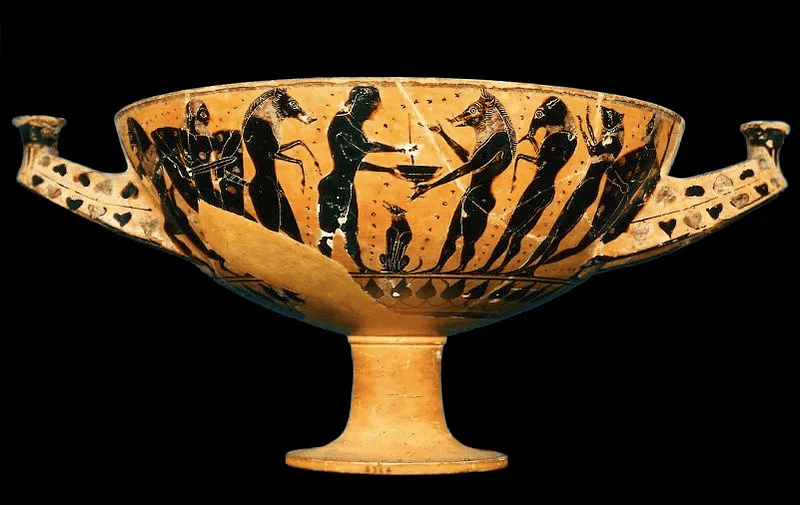
Circe’s Impact on Ancient Greek Mythology and Modern Pop Culture
Circe, the bewitching witch in the Odyssey by Homer, has left an indelible mark on ancient Greek mythology and continues to captivate audiences in modern pop culture. Her enigmatic character and intriguing story have resonated with readers throughout the ages, making her one of the most memorable figures in Greek literature.
In ancient Greek mythology, Circe represents the embodiment of feminine power and allure. She possesses a unique blend of beauty and sorcery that makes her irresistible yet dangerous to those who cross her path. Circe’s transformation ability adds another layer of complexity to her character, showcasing how she uses her powers to manipulate and control others.
Her lasting impact on ancient Greek mythology extends beyond her role in The Odyssey. Throughout various ancient literary works, including Ovid’s Metamorphoses and Apollonius’ Argonautica, Circe is often alluded to or mentioned as a significant figure associated with magic and enchantment. Her story serves as a cautionary tale about the perils of succumbing to temptation and losing one’s sense of self.
In recent times, Circe’s legacy has transcended ancient myths and found its way into modern pop culture. From novels to film adaptations, her character continues to be portrayed in different interpretations that resonate with contemporary audiences. One notable example is Madeline Miller’s best-selling novel “Circe,” which retells the story from her perspective, exploring themes of empowerment, self-discovery, redemption, and love.
In addition to literature, Circe has also made appearances in various forms of media, such as video games and television shows. Her presence in popular culture demonstrates how her enduring legacy has captured the imagination of creators who seek to reimagine her character for new audiences.
Circe’s impact goes beyond entertainment; she also serves as a source of inspiration and reflection. Her story raises questions about the nature of power, the complexities of human desire, and the consequences of our choices. Circe reminds us that even mythical beings, with all their powers and allure, are not exempt from personal growth and transformation.
Ultimately, Circe’s enduring legacy lies in her ability to transcend time and remain a relevant literary figure for generations. Her character continues to fascinate readers and viewers alike as she navigates themes of love, temptation, power, redemption, and self-discovery. Circe’s timeless appeal serves as a reminder that literature has the power to connect us across centuries and inspire us to explore our own humanity.
Conclusion
The character of Circe in The Odyssey by Homer is undoubtedly a fascinating and enigmatic figure. Throughout the epic poem, she captivates both readers and Odysseus with her mesmerizing beauty, immense powers, and divine sorcery. From her alluring aura to her role as a mentor for Odysseus, Circe’s presence holds significant weight in the story.
Circe’s character is multifaceted and complex. On one hand, she embodies temptation and danger, serving as an obstacle on Odysseus’ journey home, a tempting presence that threatens to keep him trapped forever on her island. However, we also see moments of vulnerability and redemption that humanize her.
One of the key lessons learned from Circe’s tale is the perils of succumbing to power. Her ability to transform humans into animals reveals the dangers of unchecked authority. As Odysseus and his companions are turned into swine by Circe’s enchantments, it serves as a reminder that even those with good intentions can spiral into wickedness when given too much control.
Moreover, Circe’s spells represent the fragility of free will. Despite their best intentions and resilience, Odysseus and his companions cannot resist the allure of Circe’s offerings. Their transformation illustrates how easily individuals can be swayed by external forces beyond their control, emphasizing the importance of moral fortitude in navigating life’s temptations.
Another significant aspect of Circe’s tale is her complex relationship with Odysseus. Initially driven by desire, their tumultuous love affair undergoes transformation fueled by mutual understanding and respect for one another’s abilities. As a mentor figure, Circe guides Odysseus through various challenges he faces on his journey home, providing the wisdom necessary for his eventual triumph.
Furthermore, Circe serves as a representative of growth and redemption. Despite her initially vengeful nature, she displays the capacity for change and transformation. Circe’s arc in The Odyssey showcases the potential for individuals to undergo profound personal growth and move beyond their past transgressions, offering a message of hope and second chances.
Circe’s impact on ancient Greek mythology is undeniable, as her story has endured throughout the ages. Her complex character and relationships have served as inspiration for countless retellings and adaptations, cementing her place in modern pop culture. From novels to plays to films, Circe remains a compelling figure who continues to captivate audiences with her timeless allure.
In conclusion, Circe, the bewitching witch in The Odyssey by Homer, is a character whose presence leaves a lasting impression on readers. Her mesmerizing beauty, immense powers, complex relationships, and lessons about power and redemption have solidified her status as an iconic figure in both ancient Greek mythology and modern pop culture. Circe’s tale serves as a reminder of the complexities of human nature and the potential for growth within every individual.
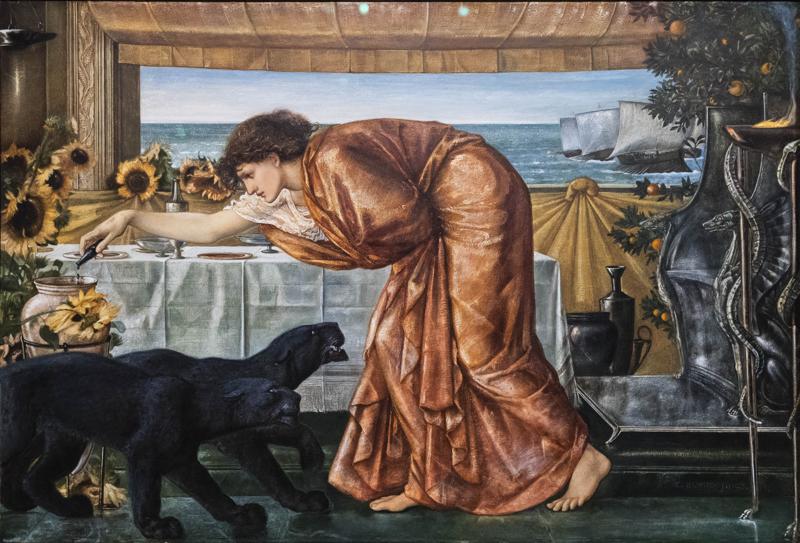
Frequently Asked Questions
What is Circe, the goddess of?
Circe is the goddess of magic in Greek mythology. She possesses the ability to use powerful spells and enchantments, often associated with transformation and sorcery. Her mastery over magic makes her a formidable figure within ancient Greek mythology, and she plays significant roles in various stories and epic poems.
Is Circe LGBTQ?
Since Circe is a legendary character from ancient mythology, it’s difficult to attribute specific modern labels such as LGBTQ to her. The concept of sexual orientation, as we understand it today, did not exist in the same form during ancient times.
While there are instances where Circe displays affection or attraction towards both men and women in mythological tales, it’s better understood within the context of those stories rather than applying contemporary classifications.
Is Circe a hard read?
Circe can be considered a moderately challenging read due to its intricate storytelling style and exploration of complex themes. Madeline Miller’s novel “Circe,” which delves into the life of the titular character, offers a unique perspective by giving voice to this often-overlooked figure in Greek mythology.
While some readers may find aspects of the book captivating and engaging, others might find it requires deeper engagement to fully appreciate its nuances and symbolism.
What is the story of Circe?
The story of Circe revolves around her transformation from an underestimated nymph into a powerful witch-goddess renowned for her mastery of magic. In Greek mythology, she features prominently in Homer’s “Odyssey,” where she interacts with Odysseus during his journey home from the Trojan War.
Circe initially attempts to turn Odysseus’ men into animals but instead falls in love with him after he resists her powers. Eventually, she helps Odysseus on his journey by providing him with guidance and counsel.
How do you pronounce the name Circe?
The name Circe is pronounced as SIR-see or SUR-see (with a soft ‘c’ sound). In English, it is commonly pronounced as SIR-see, but there may be slight variations in different languages depending on personal preference.
The pronunciation can vary because the original ancient Greek pronunciation does not directly correspond to modern English phonetics. Nevertheless, SIR-see is widely accepted and understood when referring to the mythical character Circe.
